财务报告质量与稳健会计:法律与政治制度的影响
会计稳健性研究——基于我国上市公司的经验数据

并且影响管理层薪酬, 条件稳健性就必然存在。 条件稳健性的
缺 乏 将导 致 经 理和 股 东 为 了追 逐 自身利 益提 供 不 可验 证 的 信 息, 产 生 更 加严 重 的财 务 欺 诈 和利 益掠 夺 行 为 。 我 国具 有存 在
别不 显 著 。 K o u s e n i d i s e t a 1 . ( 2 0 0 9 ) 研 究 发现 , 会 计稳 健 性是
希腊会计系统的重要特 征 ,且该 国的会计稳健性在 1 9 9 9年
又增加了 2 2项具体准则 , 这是我 国会计 史上一次重 大制度变 市场危机 之后得到提高。 学者们研究还发现 , 条件稳健性的影 革。 这一修订后的准则对我国会计稳健性的影响如何? 财务报 响因素众多。Wa t t s ( 2 0 0 3 ) 认为经济契约、 法律和政治制度等
告质量有无显著变化?这是研究我国当前会计准则和企业财 都 会 促 使 经理 和会 计 人 员作 出稳 健 的财 务报 告 。Wa n g 务报告质量的重要问题。但是 , 当前对我国上市公司 2 0 0 7年 ( 2 0 0 9 ) 等研究认 为。 完善的公司治理导致更好的管理监督 , 有
执行修订后的会计准则稳健性状况的研究较少。本文 的研究 利于稳健会计的执行。 L a F o n d和 R o y c h o w d h u r y ( 2 0 0 8 ) 研 意义表现在两方面 : 第一 , 有助于认识我 国当前会计稳健性的 状况、 变化趋势 , 为会计制度设计提供 经验依据 ; 第二 , 完善我
会计稳健性及其经济活动影响后果探析

会计稳健性及其经济活动影响后果探析【摘要】本文主要探讨了会计稳健性及其对经济活动的影响。
在分析了研究背景和本文的目的和意义。
在首先介绍了会计稳健性的概念和意义,然后详细解释了会计稳健性原则的具体内容,以及会计稳健性对经济活动和企业财务报表的影响。
接着讨论了会计稳健性对经济决策的影响。
在总结了会计稳健性在经济活动中的重要性,指出了如何把握会计稳健性以及未来研究的展望。
通过本文的研究,读者将更好地了解会计稳健性的概念和意义,以及其在经济活动中的作用,为企业和决策者提供更好的理论参考。
【关键词】会计稳健性、经济活动、会计原则、财务报表、经济决策、重要性、研究展望、风险管理、会计政策、会计信息质量、财务健康、财务透明度。
1. 引言1.1 研究背景现在就让我们来探讨一下这一部分。
会计稳健性在会计领域中一直备受关注,作为会计学的核心理念之一,稳健性对于企业的经济活动具有非常重要的影响。
随着经济全球化的深入发展,各国之间的贸易往来日益频繁,企业面临的风险与挑战也变得更加复杂和多样化。
在这样的背景下,会计稳健性的重要性愈发显现出来。
通过深入研究会计稳健性及其对经济活动的影响,可以帮助企业更好地应对风险,保障企业的经济利益,提高财务报表的真实性和可靠性,从而为企业的健康发展提供有力支持。
对于会计稳健性的研究具有十分重要的现实意义和理论价值。
我们有必要进一步探讨会计稳健性的概念和原则,以及其在企业经济决策中的影响,以便更好地引导企业实践和促进经济发展。
这一环节的重要性不容忽视,相信通过我们的探讨,会有更多有益的结论得出。
1.2 目的和意义本文旨在探讨会计稳健性及其在经济活动中所产生的影响后果,对于理解会计稳健性的概念和原则具有重要意义。
会计稳健性是会计准则中的一项基本原则,其核心目的在于保证企业财务报表的真实和公允性,同时尽可能避免对企业未来可能发生的损失进行过于乐观的估计。
稳健性原则的遵守能够提高企业财务报表的可靠性和透明度,为各类利益相关者提供准确的财务信息,有助于促进市场的有效运转和资源的合理配置。
会计政策对企业财务报告的影响及应对措施
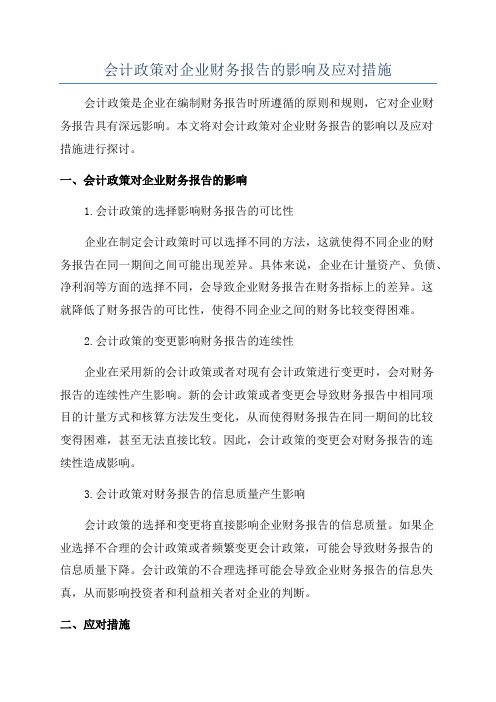
会计政策对企业财务报告的影响及应对措施会计政策是企业在编制财务报告时所遵循的原则和规则,它对企业财务报告具有深远影响。
本文将对会计政策对企业财务报告的影响以及应对措施进行探讨。
一、会计政策对企业财务报告的影响1.会计政策的选择影响财务报告的可比性企业在制定会计政策时可以选择不同的方法,这就使得不同企业的财务报告在同一期间之间可能出现差异。
具体来说,企业在计量资产、负债、净利润等方面的选择不同,会导致企业财务报告在财务指标上的差异。
这就降低了财务报告的可比性,使得不同企业之间的财务比较变得困难。
2.会计政策的变更影响财务报告的连续性企业在采用新的会计政策或者对现有会计政策进行变更时,会对财务报告的连续性产生影响。
新的会计政策或者变更会导致财务报告中相同项目的计量方式和核算方法发生变化,从而使得财务报告在同一期间的比较变得困难,甚至无法直接比较。
因此,会计政策的变更会对财务报告的连续性造成影响。
3.会计政策对财务报告的信息质量产生影响会计政策的选择和变更将直接影响企业财务报告的信息质量。
如果企业选择不合理的会计政策或者频繁变更会计政策,可能会导致财务报告的信息质量下降。
会计政策的不合理选择可能会导致企业财务报告的信息失真,从而影响投资者和利益相关者对企业的判断。
二、应对措施1.选择合适的会计政策企业在制定会计政策时应根据业务特点和财务报告的使用者需求选择合适的会计政策。
应选择能够体现企业实际运营情况和经济实质的会计政策,确保财务报告的准确性和可比性。
此外,企业还应根据会计准则的要求,关注公允价值、资产计提和减值、收入确认等关键会计政策的选择。
2.明确会计政策变更的原因和影响企业在决定变更会计政策时应明确变更的原因和影响,并及时向投资者和利益相关者进行披露。
应在财务报告中详细说明会计政策变更的内容、原因以及带来的影响,以确保财务报告的连续性和透明度。
此外,企业还应及时披露变更前后的财务指标,以便投资者和利益相关者能够准确理解企业的经营状况和财务状况。
会计准则与会计政策了解不同准则和政策对财务报表的影响

会计准则与会计政策了解不同准则和政策对财务报表的影响会计准则和会计政策是财务报表编制中的重要因素,它们对财务报表有着直接的影响。
本文将首先解释会计准则和会计政策的定义和作用,然后探讨不同准则和政策对财务报表的具体影响。
一、会计准则和会计政策的定义和作用会计准则是指会计职业界普遍认可的规范和原则,用于规定和引导企业在编制财务报表时应遵循的会计方法和程序。
会计准则的制定旨在提高财务报表的信息质量、可比性和透明度,从而保护投资者和其他利益相关方的利益,维护市场秩序的正常运作。
会计政策是企业在将会计准则应用于具体业务操作时所制定和执行的具体方法、原则和规则。
会计政策可以根据企业的经营状况、行业特点和管理需求而灵活调整,以确保财务报表能够准确反映企业的财务状况和经营成果。
二、不同准则和政策对财务报表的影响1. 会计准则对财务报表的影响不同国家和地区会有不同的会计准则,其中较为知名的包括国际财务报告准则(IFRS)和中国会计准则(CAS)。
这些准则在计量、分类和披露等方面都有所不同,因此编制的财务报表可能会存在差异。
举例来说,IFRS要求按公允价值计量的金融工具必须在财务报表中披露其公允价值的变动和未实现收益或损失,而CAS则允许使用成本法计量。
如果一个企业同时适用IFRS和CAS,其财务报表可能会在这一项上出现差异。
2. 会计政策对财务报表的影响会计政策的选择和执行对财务报表的编制和呈现产生直接影响。
企业可以根据自身情况和目标制定不同的会计政策。
举例来说,企业在计提坏账准备时可以选择按实际发生的坏账进行计提,也可以按销售额的一定比例计提。
这两种方法可能会导致财务报表上的坏账准备数额不同,从而影响资产负债表和损益表的数据。
3. 准则及政策变更对财务报表的影响准则和政策的变更同样会对财务报表产生影响。
例如,当国际会计准则发生变更时,企业需要调整其会计政策以符合新的要求,这将影响到财务报表中相关项目的数据。
当准则和政策发生变更时,企业应该及时更新其会计制度和财务报表,确保报表的准确性和可比性。
会计稳健性影响因素及经济后果研究

会计稳健性影响因素及经济后果研究会计稳健性是指在面临不确定性时,相关方更倾向于降低利润或增加负债以保守地处理相关会计事项。
这种保守性处理可以有效地降低风险,确保财务报表准确和可靠。
本文将探讨会计稳健性的影响因素以及其对经济的后果。
一、会计稳健性的影响因素1.法律、法规和准则法律、法规和准则对会计稳健性起着重要的指导作用。
一些法规和准则要求企业在面临不确定性时采取保守的会计政策,以确保财务报告的准确性和可靠性。
例如,国家会计准则要求企业根据实际情况合理评估风险,提出合理的预计损失准备金。
2.经济环境经济环境是会计稳健性的重要影响因素之一。
在经济不景气时,企业更倾向于采取保守的会计政策,以防止风险加剧。
相反,在经济繁荣期,企业可能更愿意冒风险以追求更高的利润。
因此,经济环境的不同会对会计稳健性产生不同的影响。
3.管理层行为管理层在会计稳健性中发挥着关键作用。
管理层的风险偏好和道德观念会直接影响会计政策的选择。
一些管理层可能会在面临不确定性时采取保守的做法,以避免可能的风险。
而有些管理层则可能更倾向于高估盈利,从而选择较为激进的会计政策。
二、会计稳健性的经济后果1.投资者信任和资本市场稳定会计稳健性可以增强投资者对财务报表的信任,从而增加资本市场的稳定性。
当财务报表准确和可靠时,投资者更容易做出明智的投资决策,使市场更加高效。
相反,如果财务报表存在夸大利润或隐瞒风险的行为,投资者信任将受到破坏,资本市场可能出现动荡。
2.信贷风险和债务成本会计稳健性可以降低企业的信贷风险,并对债务成本产生积极影响。
保守的财务报表可以让债权人更加信任企业的财务状况,并降低债务融资成本。
相反,不稳健的会计处理可能导致企业信誉下降,使债权人对企业的信任减少,债务成本增加。
3.经营决策和风险管理会计稳健性对企业的经营决策和风险管理也有重要影响。
保守处理会计事项可以帮助企业更好地识别和评估风险,从而采取适当的经营策略。
如果企业过于乐观地处理会计事项,可能会掩盖真实的风险,导致经营决策出现偏差。
会计学中的法律和法规对财务报告的影响

会计学中的法律和法规对财务报告的影响会计学作为一门重要的商科学科,与法律和法规之间存在着密切的联系。
法律和法规的制定和实施对财务报告产生着重要的影响,进一步规范了企业的会计行为,保障了财务报告的可靠性和透明度。
本文将探讨会计学中的法律和法规对财务报告的影响,并分析其作用和意义。
1. 法律与法规的衔接:规范会计实务法律是一系列由国家或地方政府制定的强制性规范,而法规则是的衍生物,是对法律进行具体细化和解释的行政法规。
在会计学中,法律和法规通过对会计实务的规范,确保财务报告的准确性和可比性。
2. 会计制度与财务报告:建立可靠的信息披露会计制度是法律和法规框架下制定的一系列会计准则和程序,旨在规范企业的财务会计操作。
财务报告作为企业向利益相关方提供的重要信息,必须符合会计制度的要求,以确保其真实性和可靠性。
3. 法律责任与内部控制:保障财务报告的透明度法律和法规为企业和会计从业者明确了法律责任和义务,对于虚假财务报告进行了明确的制度和惩罚性规定。
同时,法律要求企业建立健全的内部控制制度,以确保财务报告的真实性和透明度。
4. 法律与国际会计准则:推动财务报告的国际化在全球化的背景下,各国法律和法规不断趋于一致。
国际会计准则理事会(IASB)发布的国际财务报告准则(IFRS)成为全球范围内的财务报告准则,通过适应国际法律和法规的要求,促进了财务报告的国际化。
5. 法律检查与审计:增加财务报告的可信度法律要求上市公司进行年度审计,由独立的注册会计师事务所进行。
审计将财务报告与法律和法规进行对照,确保企业遵守相关财务会计准则和法律要求,增加了财务报告的可信度。
6. 法律与税收规定:影响财务报告的税务核算和合规性税收规定是法律和法规的重要组成部分,直接影响企业的报表编制和税收核算。
企业需要根据法律和法规规定,合理配置和利用税收优惠政策,以最大程度减少税收负担并遵守税法的要求。
7. 法律变革与准则更新:对财务报告产生影响法律和法规是动态的,随着时代的变迁和国家政策的调整,相关法律也在不断变革。
会计稳健性对企业的重要意义
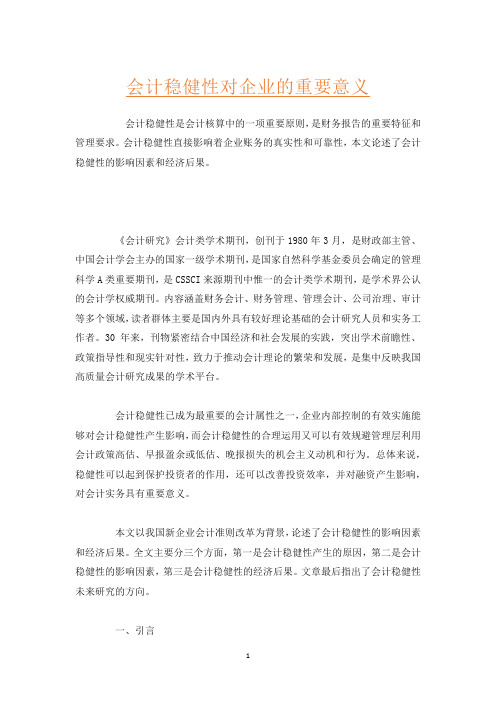
会计稳健性对企业的重要意义会计稳健性是会计核算中的一项重要原则,是财务报告的重要特征和管理要求。
会计稳健性直接影响着企业账务的真实性和可靠性,本文论述了会计稳健性的影响因素和经济后果。
《会计研究》会计类学术期刊,创刊于1980年3月,是财政部主管、中国会计学会主办的国家一级学术期刊,是国家自然科学基金委员会确定的管理科学A类重要期刊,是CSSCI来源期刊中惟一的会计类学术期刊,是学术界公认的会计学权威期刊。
内容涵盖财务会计、财务管理、管理会计、公司治理、审计等多个领域,读者群体主要是国内外具有较好理论基础的会计研究人员和实务工作者。
30年来,刊物紧密结合中国经济和社会发展的实践,突出学术前瞻性、政策指导性和现实针对性,致力于推动会计理论的繁荣和发展,是集中反映我国高质量会计研究成果的学术平台。
会计稳健性已成为最重要的会计属性之一,企业内部控制的有效实施能够对会计稳健性产生影响,而会计稳健性的合理运用又可以有效规避管理层利用会计政策高估、早报盈余或低估、晚报损失的机会主义动机和行为。
总体来说,稳健性可以起到保护投资者的作用,还可以改善投资效率,并对融资产生影响,对会计实务具有重要意义。
本文以我国新企业会计准则改革为背景,论述了会计稳健性的影响因素和经济后果。
全文主要分三个方面,第一是会计稳健性产生的原因,第二是会计稳健性的影响因素,第三是会计稳健性的经济后果。
文章最后指出了会计稳健性未来研究的方向。
一、引言会计稳健性原则,又称谨慎性原则,是指在处理不确定的经济业务时,应保持谨慎的态度。
稳健性原则是一项基本的会计计量原则,是财务报告的重要特征和管理要求,也是会计盈余的重要质量特征之一。
它要求企业凡是可以预见的损失和费用都应进行记录和确认,而没有十足把握的收入则不能确认和入账,不应高估资产,也不能低估负债,使会计核算尽可能建立在比较稳妥的基础上。
稳健性很早就已经被确认为会计的基本原则之一,但却是从20世纪90年代很多国家的会计准则中采用了公允价值计量,随后才兴起对其的系统研究。
公司治理与会计稳健性

公司治理与会计稳健性公司治理与会计稳健性1. 引言公司治理是指管理者如何履行其职责,提高公司管理效能的一套制度与机制。
而会计稳健性则是指会计信息应当真实反映公司财务状况,及时提供准确的财务报告。
公司治理和会计稳健性之间存在着紧密的联系,本文将探讨二者之间的关系,并讨论对于企业而言如何保证会计稳健性。
2. 公司治理与会计稳健性的关系公司治理是保护投资者利益和增进股东价值的重要手段之一。
会计信息是股东和投资者决策的重要依据。
因此,公司治理机制应当确保会计信息的稳健性。
2.1 透明度与信息披露透明度是公司治理的核心要素之一,它要求企业用真实、准确的会计信息进行信息披露。
只有充分披露的信息,才能使股东和投资者了解公司的财务状况和经营状况,从而做出明智的决策。
透明度的提高有助于提高会计信息的稳健性。
2.2 独立性与审计独立性是公司治理的另一个重要要素,它要求独立审计机构对财务报告进行审计,确保其真实性和准确性。
独立审计可以有效地发现和纠正财务报表中的不真实或虚假信息,保证会计信息的稳健性。
3. 公司治理与会计稳健性的问题在实践中,公司治理和会计稳健性也面临着一些问题。
3.1 内部控制体系内部控制体系是确保会计信息准确性和可靠性的重要机制。
然而,一些企业的内部控制体系不完善,会导致会计信息的不稳健。
例如,没有足够的内部审计程序和控制措施,容易导致会计舞弊和财务报表的不准确。
3.2 信息技术安全随着信息技术的快速发展,企业的会计信息系统也越来越依赖于计算机和网络。
然而,信息技术安全问题也给会计稳健性带来了风险。
例如,黑客攻击、数据泄露等问题可能破坏会计信息的真实性和准确性。
4. 保证会计稳健性的措施为了提高会计稳健性,企业可以采取以下措施:4.1 建立完善的内部控制体系企业应当建立完善的内部控制体系,确保财务信息及时准确地流入会计系统,并通过内部审计程序和控制措施发现和纠正潜在问题。
4.2 强化独立审计企业应当与独立审计机构建立稳固的合作关系,进行独立审计,确保财务报告的真实性和准确性。
新政府会计制度对财务管理的影响

新政府会计制度对财务管理的影响标题1:新政府会计制度对财务报表编制的影响摘要:新政府会计制度要求更严格的财务报表编制标准,会使得财务报表更加真实可靠,但会带来高质量财务报表编制的成本。
分析:在旧的会计制度下,许多公司都采用了一些不规范的财务报表编制方式,以获取更多的利益。
但是随着新政府会计制度的颁布,各公司将面临更严格的财务报表编制要求。
这些要求包括财务报表要真实可靠,所有财务交易必须记录明细等等。
这将会带来更高的编制成本。
然而,新政府会计制度的实施也会使得财务报表更加真实可靠,为公司的融资和投资决策提供更多的参考和可靠依据。
总结:新政府会计制度的实施对财务报表编制产生了积极的影响,能够让公司编制出真实可靠的财务报表,但是也需要承担更高的编制成本。
标题2:新政府会计制度对资产负债表的影响摘要:新政府会计制度要求将部分资产或负债列入到资产负债表中,会让资产负债表更加真实可靠,但公司也会面临一些变化。
分析:在旧的会计制度下,有些公司可能会隐藏或虚报部分资产或负债,这使得公司的资产负债表并不真实可靠。
新政府会计制度要求将一些之前未列入资产负债表的资产或负债列入到资产负债表中,如资本化的研发支出,商标等等。
这会使得资产负债表更加真实可靠,但也会让公司面临一些变化,如减少规避的空间,可能降低公司的财务指标等等。
总结:新政府会计制度对资产负债表产生了积极的影响,能够使得资产负债表更加真实可靠,但就像所有变化一样,新政府会计制度的实施也会给公司的运营带来一些变化和挑战。
标题3:新政府会计制度对资产减值的影响摘要:新政府会计制度要求对资产减值进行更加详细的披露,能有效避免重演雷曼案件,但也会带来更高的调整成本。
分析:新政府会计制度要求公司对其资产减值进行更加详细的披露,这能够在极大程度上避免公司重演雷曼案件之类的事件。
在新政府会计制度下,对资产减值的计算标准更加细化,公司需要花更多的时间和资金来确定资产减值的金额。
浅析经济、政治和文化环境对会计发展影响

浅析经济、政治和文化环境对会计发展影响作者:刘露来源:《现代经济信息》2017年第12期摘要:随着改革开放步伐的加快,会计行业成为社会经济高速发展过程中的重要行业,对企事业单位和国家繁荣富强有着至关重要的作用,必须重视会计行业的发展趋势。
会计环境与会计的产生、发展密切相关,任何事物的产生和发展都离不开环境的影响,会计是人类社会经济生活的利益平衡点,是社会文明的产物,自然也会受到环境的影响。
人类对于周围会计环境的认识不断深入,会计活动会做出相应的反应,会计人员的行为是在一定的环境中形成,会计环境的不同在一定程度上也会更新会计人员的观念。
会计环境的发展与变化,使得会计工作相应的改善,如果会计环境恶化了,会计的发展必然会受到阻碍。
相应地,会计发展的状况,始终受到会计环境的制约与促进。
所以说对于会计环境的研究是分析会计问题的关键一步,本文将从会计环境的政治、经济与文化三个方面简单地叙述对会计的影响,使得会计有良好的环境进一步发展。
关键词:会计;会计环境;政治;经济;文化中图分类号:F230 文献识别码:A 文章编号:1001-828X(2017)012-0-01所谓会计环境,是指会计为了生存与发展所处的各种客观条件与周边状况,存在于会计系统之外,影响着会计行业、会计理论、政治、经济、社会和文化等方面进程,它包括自然环境和社会环境,而本文主要讨论的是它的社会环境。
而会计是以货币为主要计量单位,采用一系列专门方法和程序,对经济交易或事项进行连续、系统、综合地核算和监督,提供经济信息,参与预测决策的一种管理活动。
一、经济环境对会计发展的影响随着会计实践的发展,人们对会计环境的认知越来越深刻,他们不仅对事物处于什么样的新状态感兴趣,还对经济自身如何从旧状态迈出达到新状态的过程进行钻研。
在社会生活的三个基本领域里,经济是基础,是人们在社会生产中形成的各种关系和获得利益的标志,是一个国家在世界拥有更多话语权的保障。
会计管理制度对财务报告的影响及分析

会计管理制度对财务报告的影响及分析2023年,随着全球经济的不断发展和市场竞争的加剧,企业的财务状况越来越受到关注。
财务报告成为了企业向外界展示自己财务状况的最主要途径。
在这个背景下,会计管理制度成为了企业财务报告的重要组成部分,其在财务报告中的影响也越来越显著。
一、会计管理制度对财务报告的影响1.规范企业财务管理会计管理制度是企业财务管理中的一个重要环节。
它通过对企业财务活动进行正规、合法、标准化的管理,确保企业财务报告的真实可靠性。
企业财务活动遵循会计管理制度,能够有效地控制财务风险,减少错误和失误。
2.提高财务报告的准确性财务报告是反映企业财务状况的重要工具。
采用会计管理制度能够保证财务报告数据的可比性、可靠性和一致性,提高财务报告的准确性,从而提高财务报告的可信度和说服力。
3.增强企业信誉度随着市场对企业透明度的要求越来越高,一份真实、准确、可信的财务报告对企业信誉度的重要性越来越高。
通过遵守会计管理制度,企业能够合法合规地运营财务活动,从而提高企业的信誉度。
4.确保企业合规性财务报告不仅是企业自身内部经营管理的必要工具,也是监管部门对企业进行风险评估的主要手段。
遵循会计管理制度能够确保企业财务活动合规,避免因违反法规法律而导致的罚款、处罚等风险。
二、会计管理制度的分析1.会计管理制度的内容丰富多样会计管理制度由多种方面的内容所组成,包括会计核算、财务管理、会计制度建设、企业内控管理等。
企业需要从不同层面对其进行规范管理,这样才能够有效地保证财务报告的真实性可靠性。
2.会计管理制度的实施需要注重合理性会计管理制度的实施需要注重其合理性,否则会导致财务活动受到限制、工作效率降低。
因此,企业需要根据自身的实际情况,合理制定会计管理制度,适应企业经营特点和财务管理需要。
3.会计管理制度需要注意与市场趋势的结合随着市场需求不断变化,会计管理制度也需要不断地与市场发展趋势相结合。
企业要随时关注市场变化和监管政策,及时调整会计管理制度,以便适应企业的发展需要,增加企业竞争力。
财务工作业绩总结报告
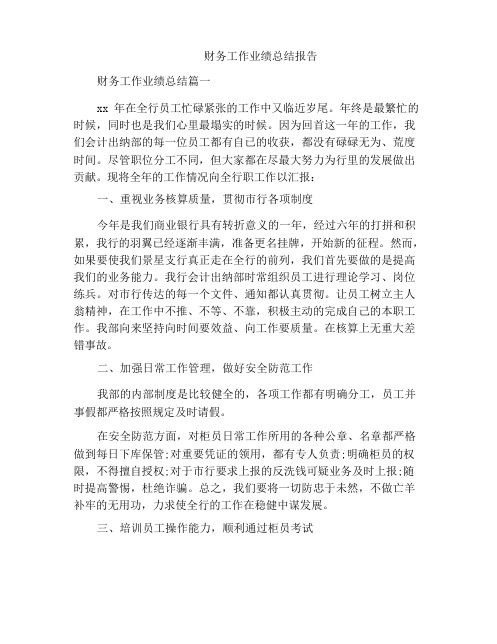
财务工作业绩总结报告财务工作业绩总结篇一xx 年在全行员工忙碌紧张的工作中又临近岁尾。
年终是最繁忙的时候,同时也是我们心里最塌实的时候。
因为回首这一年的工作,我们会计出纳部的每一位员工都有自已的收获,都没有碌碌无为、荒度时间。
尽管职位分工不同,但大家都在尽最大努力为行里的发展做出贡献。
现将全年的工作情况向全行职工作以汇报:一、重视业务核算质量,贯彻市行各项制度今年是我们商业银行具有转折意义的一年,经过六年的打拼和积累,我行的羽翼已经逐渐丰满,准备更名挂牌,开始新的征程。
然而,如果要使我们景星支行真正走在全行的前列,我们首先要做的是提高我们的业务能力。
我行会计出纳部时常组织员工进行理论学习、岗位练兵。
对市行传达的每一个文件、通知都认真贯彻。
让员工树立主人翁精神,在工作中不推、不等、不靠,积极主动的完成自己的本职工作。
我部向来坚持向时间要效益、向工作要质量。
在核算上无重大差错事故。
二、加强日常工作管理,做好安全防范工作我部的内部制度是比较健全的,各项工作都有明确分工,员工并事假都严格按照规定及时请假。
在安全防范方面,对柜员日常工作所用的各种公章、名章都严格做到每日下库保管;对重要凭证的领用,都有专人负责;明确柜员的权限,不得擅自授权;对于市行要求上报的反洗钱可疑业务及时上报;随时提高警惕,杜绝诈骗。
总之,我们要将一切防忠于未然,不做亡羊补牢的无用功,力求使全行的工作在稳健中谋发展。
三、培训员工操作能力,顺利通过柜员考试今年是对全行职工个人业务考核要求最严格的一年,综合柜员上岗考试,直接关系到了每一个员工的切身利益。
行里不想让任何一个职工掉队,我会计出纳部,为了使每一个员工顺利的通过考试,带领员工们利用工作之外一切所能利用的时间,积极准备考试。
此间,我们组织了员工点钞,打字的基本技能考试。
组织员工去培训中心进行业务上机打操作的练习。
有些员工工作、家庭的各方面负担都很重,考试给其带来了很大的心理压力,思想包袱很重。
浅析经济、政治和文化环境对会计发展影响
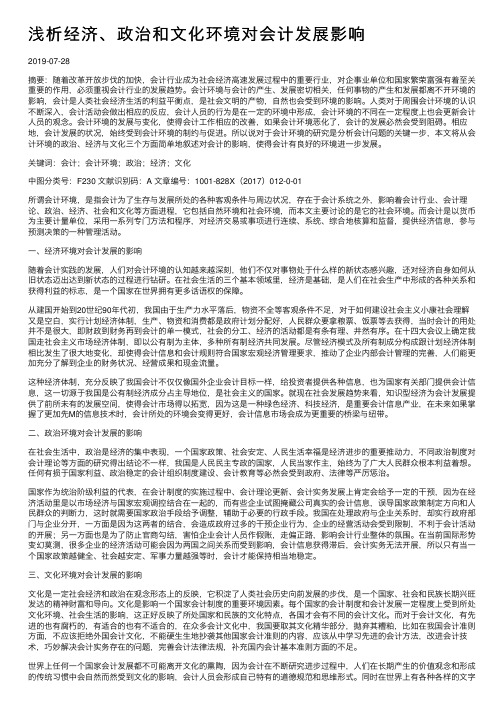
浅析经济、政治和⽂化环境对会计发展影响2019-07-28摘要:随着改⾰开放步伐的加快,会计⾏业成为社会经济⾼速发展过程中的重要⾏业,对企事业单位和国家繁荣富强有着⾄关重要的作⽤,必须重视会计⾏业的发展趋势。
会计环境与会计的产⽣、发展密切相关,任何事物的产⽣和发展都离不开环境的影响,会计是⼈类社会经济⽣活的利益平衡点,是社会⽂明的产物,⾃然也会受到环境的影响。
⼈类对于周围会计环境的认识不断深⼊,会计活动会做出相应的反应,会计⼈员的⾏为是在⼀定的环境中形成,会计环境的不同在⼀定程度上也会更新会计⼈员的观念。
会计环境的发展与变化,使得会计⼯作相应的改善,如果会计环境恶化了,会计的发展必然会受到阻碍。
相应地,会计发展的状况,始终受到会计环境的制约与促进。
所以说对于会计环境的研究是分析会计问题的关键⼀步,本⽂将从会计环境的政治、经济与⽂化三个⽅⾯简单地叙述对会计的影响,使得会计有良好的环境进⼀步发展。
关键词:会计;会计环境;政治;经济;⽂化中图分类号:F230 ⽂献识别码:A ⽂章编号:1001-828X(2017)012-0-01所谓会计环境,是指会计为了⽣存与发展所处的各种客观条件与周边状况,存在于会计系统之外,影响着会计⾏业、会计理论、政治、经济、社会和⽂化等⽅⾯进程,它包括⾃然环境和社会环境,⽽本⽂主要讨论的是它的社会环境。
⽽会计是以货币为主要计量单位,采⽤⼀系列专门⽅法和程序,对经济交易或事项进⾏连续、系统、综合地核算和监督,提供经济信息,参与预测决策的⼀种管理活动。
⼀、经济环境对会计发展的影响随着会计实践的发展,⼈们对会计环境的认知越来越深刻,他们不仅对事物处于什么样的新状态感兴趣,还对经济⾃⾝如何从旧状态迈出达到新状态的过程进⾏钻研。
在社会⽣活的三个基本领域⾥,经济是基础,是⼈们在社会⽣产中形成的各种关系和获得利益的标志,是⼀个国家在世界拥有更多话语权的保障。
从建国开始到20世纪90年代初,我国由于⽣产⼒⽔平落后,物资不全等客观条件不⾜,对于如何建设社会主义⼩康社会理解⼜是空⽩,实⾏计划经济体制,⽣产、物资和消费都是政府计划分配好,⼈民群众要拿粮票、饭票等去获得,当时会计的⽤处并不是很⼤,即财政到财务再到会计的单⼀模式,社会的分⼯、经济的活动都是有条有理、井然有序。
财务报告稳健性的影响因素及对策研究
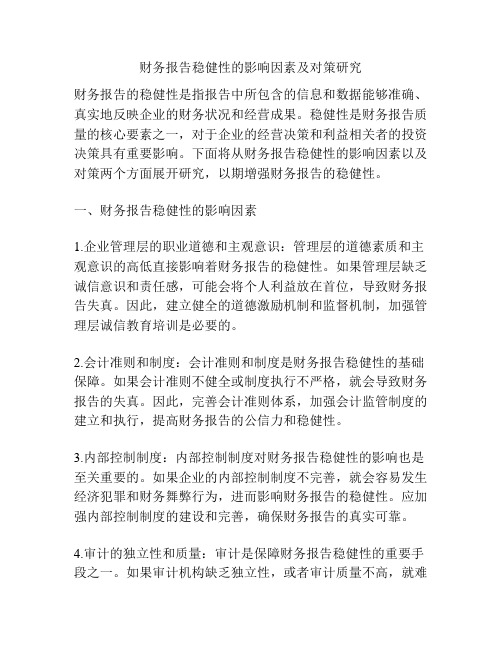
财务报告稳健性的影响因素及对策研究财务报告的稳健性是指报告中所包含的信息和数据能够准确、真实地反映企业的财务状况和经营成果。
稳健性是财务报告质量的核心要素之一,对于企业的经营决策和利益相关者的投资决策具有重要影响。
下面将从财务报告稳健性的影响因素以及对策两个方面展开研究,以期增强财务报告的稳健性。
一、财务报告稳健性的影响因素1.企业管理层的职业道德和主观意识:管理层的道德素质和主观意识的高低直接影响着财务报告的稳健性。
如果管理层缺乏诚信意识和责任感,可能会将个人利益放在首位,导致财务报告失真。
因此,建立健全的道德激励机制和监督机制,加强管理层诚信教育培训是必要的。
2.会计准则和制度:会计准则和制度是财务报告稳健性的基础保障。
如果会计准则不健全或制度执行不严格,就会导致财务报告的失真。
因此,完善会计准则体系,加强会计监管制度的建立和执行,提高财务报告的公信力和稳健性。
3.内部控制制度:内部控制制度对财务报告稳健性的影响也是至关重要的。
如果企业的内部控制制度不完善,就会容易发生经济犯罪和财务舞弊行为,进而影响财务报告的稳健性。
应加强内部控制制度的建设和完善,确保财务报告的真实可靠。
4.审计的独立性和质量:审计是保障财务报告稳健性的重要手段之一。
如果审计机构缺乏独立性,或者审计质量不高,就难以对企业的财务状况进行准确的评估,导致财务报告失真。
因此,应加强对审计机构的监督和管理,提高审计质量和独立性。
二、财务报告稳健性的对策1.建立健全的内部控制制度:企业应通过完善内部控制制度,加强相应的风险控制和预警机制,确保财务报告的真实可靠。
内部控制制度应包括合理的会计政策、充分的内部控制程序和审计控制,以及内部审计机构的设立等。
2.加强对管理层的教育和培训:企业应加强对管理层的职业道德教育和财务知识培训,提高管理层的诚信意识和责任感。
此外,建立激励机制,对诚信经营和财务报告稳健性给予一定的经济和荣誉激励,以增强管理层对财务报告稳健性的重视。
《2024年会计稳健性对企业并购行为及绩效的影响》范文
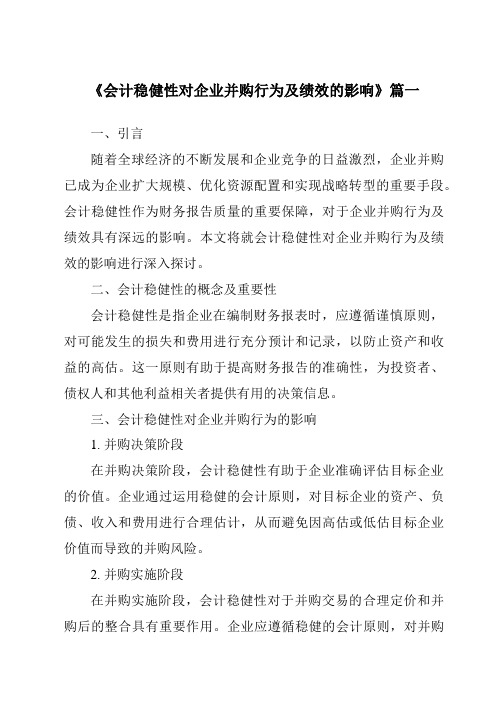
《会计稳健性对企业并购行为及绩效的影响》篇一一、引言随着全球经济的不断发展和企业竞争的日益激烈,企业并购已成为企业扩大规模、优化资源配置和实现战略转型的重要手段。
会计稳健性作为财务报告质量的重要保障,对于企业并购行为及绩效具有深远的影响。
本文将就会计稳健性对企业并购行为及绩效的影响进行深入探讨。
二、会计稳健性的概念及重要性会计稳健性是指企业在编制财务报表时,应遵循谨慎原则,对可能发生的损失和费用进行充分预计和记录,以防止资产和收益的高估。
这一原则有助于提高财务报告的准确性,为投资者、债权人和其他利益相关者提供有用的决策信息。
三、会计稳健性对企业并购行为的影响1. 并购决策阶段在并购决策阶段,会计稳健性有助于企业准确评估目标企业的价值。
企业通过运用稳健的会计原则,对目标企业的资产、负债、收入和费用进行合理估计,从而避免因高估或低估目标企业价值而导致的并购风险。
2. 并购实施阶段在并购实施阶段,会计稳健性对于并购交易的合理定价和并购后的整合具有重要作用。
企业应遵循稳健的会计原则,对并购交易中的各项成本和费用进行准确记录和核算,以确保并购交易的公平性和合理性。
此外,在并购后的整合过程中,会计稳健性有助于企业及时发现和解决潜在的风险和问题,确保并购后的运营稳定。
四、会计稳健性对企业并购绩效的影响1. 短期绩效会计稳健性对企业的短期并购绩效具有积极影响。
企业在并购过程中遵循稳健的会计原则,能够确保并购交易的合理定价和公平性,降低并购风险。
此外,准确的财务报告有助于投资者和债权人对企业并购行为的信心,从而提高企业的市场声誉和股价。
2. 长期绩效长期来看,会计稳健性对企业的并购绩效具有更为显著的影响。
企业通过遵循稳健的会计原则,能够及时发现和解决潜在的风险和问题,确保并购后的运营稳定。
此外,准确的财务信息有助于企业制定合理的战略规划和资源配置,提高企业的竞争力和盈利能力。
这些因素共同作用,有助于企业在长期内实现更好的并购绩效。
会计规则的由来读书记录
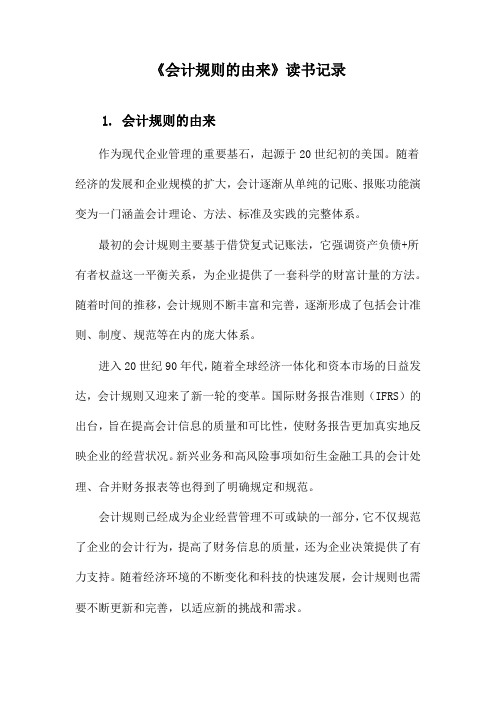
《会计规则的由来》读书记录1. 会计规则的由来作为现代企业管理的重要基石,起源于20世纪初的美国。
随着经济的发展和企业规模的扩大,会计逐渐从单纯的记账、报账功能演变为一门涵盖会计理论、方法、标准及实践的完整体系。
最初的会计规则主要基于借贷复式记账法,它强调资产负债+所有者权益这一平衡关系,为企业提供了一套科学的财富计量的方法。
随着时间的推移,会计规则不断丰富和完善,逐渐形成了包括会计准则、制度、规范等在内的庞大体系。
进入20世纪90年代,随着全球经济一体化和资本市场的日益发达,会计规则又迎来了新一轮的变革。
国际财务报告准则(IFRS)的出台,旨在提高会计信息的质量和可比性,使财务报告更加真实地反映企业的经营状况。
新兴业务和高风险事项如衍生金融工具的会计处理、合并财务报表等也得到了明确规定和规范。
会计规则已经成为企业经营管理不可或缺的一部分,它不仅规范了企业的会计行为,提高了财务信息的质量,还为企业决策提供了有力支持。
随着经济环境的不断变化和科技的快速发展,会计规则也需要不断更新和完善,以适应新的挑战和需求。
《会计规则的由来》这本书为我们揭示了会计规则的发展历程和演变。
通过了解会计规则的历史背景和发展趋势,我们可以更好地理解会计在企业管理中的重要作用和价值,为企业的稳健发展提供有力保障。
1.1 会计的起源和发展会计作为一种职业和学科,有着悠久的历史。
会计的发展经历了不同的阶段,其起源和发展与人类社会的进步密切相关。
本文将从会计的起源、古代会计、现代会计等方面来探讨会计的发展历程。
我们来看会计的起源,会计的起源可以追溯到远古时期,当时人们开始记录狩猎、捕鱼等活动,以便了解食物来源和剩余情况。
这种对资源的管理就是最早的会计实践,随着社会的发展,会计逐渐演变为一种专门的职业。
在古代文明如埃及、巴比伦、印度等地,都有关于会计的记载。
这些古代文明通过编制财务报表,对企业和政府的财政状况进行管理。
古代会计主要采用手工记账的方式,将各种经济业务按照一定的规则和分类进行记录。
会计政策选择对财务报告质量的影响

会计政策选择对财务报告质量的影响在当今复杂多变的商业环境中,企业的会计政策选择对于财务报告质量具有至关重要的影响。
财务报告是企业向外界传递财务状况和经营成果的重要工具,而会计政策的选择则在很大程度上决定了这些信息的呈现方式和质量。
会计政策是指企业在会计核算时所遵循的原则、基础和处理方法。
企业在遵循会计准则的前提下,拥有一定的选择权来确定适合自身情况的会计政策。
这种选择权的存在是为了更好地反映企业的经济实质,但同时也可能被不当利用,从而对财务报告质量产生负面影响。
首先,合理的会计政策选择能够提高财务报告的相关性和可靠性。
相关性意味着财务报告所提供的信息能够满足使用者的决策需求。
例如,对于一家处于高速增长阶段的科技企业,选择加速折旧法来计提固定资产折旧,可以更准确地反映资产的使用效率和经济价值的消耗,为投资者和管理层提供更具决策价值的信息。
可靠性则要求财务报告中的信息真实、可验证且中立无偏。
通过选择恰当的存货计价方法,如先进先出法或加权平均法,可以避免存货价值的高估或低估,增强财务报告的可信度。
然而,如果企业出于某些不正当的动机进行会计政策选择,就可能导致财务报告质量下降。
比如,为了达到特定的盈利目标,企业可能会变更会计政策,将费用资本化而非费用化,从而虚增利润。
这种做法不仅误导了投资者和债权人的决策,也破坏了市场的公平和透明。
会计政策选择的不当还可能导致财务报告的可比性降低。
不同企业之间,如果在类似的经济业务中采用不同的会计政策,那么财务数据的比较就会变得困难。
即使是同一企业,频繁变更会计政策也会使得不同期间的财务数据缺乏可比性,影响使用者对企业发展趋势的判断。
此外,复杂和不透明的会计政策选择会增加财务报告的理解难度。
对于非专业的财务报告使用者来说,过于复杂的会计政策可能导致他们无法准确理解企业的财务状况和经营成果。
这不仅降低了财务报告的沟通效果,还可能引发市场的误解和不信任。
为了确保会计政策选择能够提高而不是损害财务报告质量,企业应当建立健全的内部治理机制。
注册会计师考试知识点:政治和法律因素

注册会计师考试《风险管理》科⽬知识点复习:政治和法律因素政治和法律因素分析是指⼀个国家或地区的政治体制、政治制度、⽅针政策以及法律法规等⽅⾯对于企业战略的影响进⾏分析。
(⼀)政治环境因素分析1、所在地区和国家的政局稳定状况。
2、政府⾏为对企业的影响。
3、执政党所持的态度和推⾏的基本政策,及连续性和稳定性。
4、各政治利益集团对企业活动产⽣的影响。
政治风险,指政府可能改变税收政策或计划增加其在企业中所占的股份⽐例,以增强政府影响⼒或满⾜当地的民意。
1、所有权风险:委内瑞拉07年把由多国公司管理的18个海上⽯油钻探平台收归国有。
2、经营风险:地⽅保护政策,要求本地企业参与或者控股。
3、转移风险:转移资⾦或者返回利润的能⼒受到限制。
跨国企业规避政治风险的措施:1、在向某个国家投资前先进⾏详细的风险评估。
2、与其他企业⼀起执⾏项⽬以分散风险。
3、避免完全信赖某个国家。
4、向本国政府寻求政治⽀持。
5、与当地企业合作以提⾼项⽬的可承接性并寻求政治⽀持。
(⼆)法律环境因素分析法律是政府管理企业的⼀种⼿段。
企业是受监管的经济体。
监管⼿段之⼀是法律法规。
⼀般⽽⾔,当地政府通过法律法规来间接影响企业的活动。
还有⼀些国际性的法律,国际经济法,WTO规则等。
法律法规的存在有以下四⼤⽬的:1、保护企业,反对不正当竞争,反垄断法。
2、保护消费者,这涵盖许多,包括商品包装、商标、⾷品卫⽣、⼴告及其他⽅⾯的消费者保护法规。
消费者权益保护法。
3、保护员⼯,这包括涉及员⼯招聘的法律和对⼯作条件进⾏控制的健康与安全⽅⾯的法规。
劳动合同法、劳动法。
4、保护公共权益免受不合理企业⾏为的损害。
环境保护法。
法律环境因素分析主要是对以下四个因素进⾏分析:1、法律规范,特别是经济法律法规。
2、国家司法执法机关。
3、企业的法律意识。
4、国际法律环境和⽬标国的国内法律环境。
(三)政治法律环境因素对企业影响的特点1、不可测性,很难预测变化。
2、直接性,政府财政收⼊与补贴的提升或降低直接影响企业的成本或收⼊。
2023年会计制度变迁对会计稳健性的影响
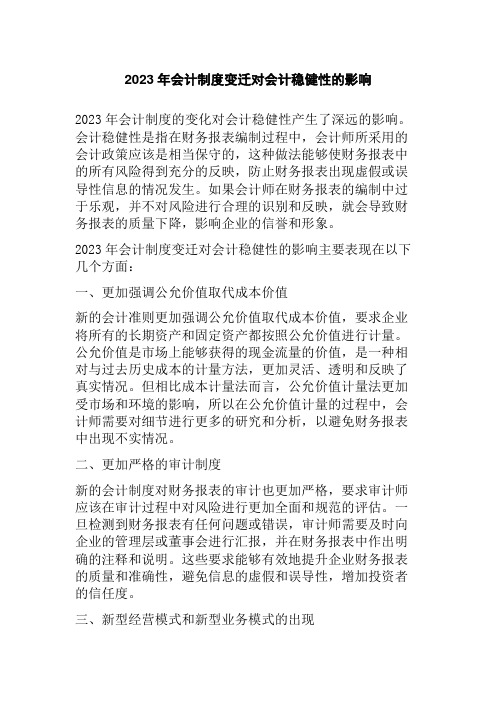
2023年会计制度变迁对会计稳健性的影响2023年会计制度的变化对会计稳健性产生了深远的影响。
会计稳健性是指在财务报表编制过程中,会计师所采用的会计政策应该是相当保守的,这种做法能够使财务报表中的所有风险得到充分的反映,防止财务报表出现虚假或误导性信息的情况发生。
如果会计师在财务报表的编制中过于乐观,并不对风险进行合理的识别和反映,就会导致财务报表的质量下降,影响企业的信誉和形象。
2023年会计制度变迁对会计稳健性的影响主要表现在以下几个方面:一、更加强调公允价值取代成本价值新的会计准则更加强调公允价值取代成本价值,要求企业将所有的长期资产和固定资产都按照公允价值进行计量。
公允价值是市场上能够获得的现金流量的价值,是一种相对与过去历史成本的计量方法,更加灵活、透明和反映了真实情况。
但相比成本计量法而言,公允价值计量法更加受市场和环境的影响,所以在公允价值计量的过程中,会计师需要对细节进行更多的研究和分析,以避免财务报表中出现不实情况。
二、更加严格的审计制度新的会计制度对财务报表的审计也更加严格,要求审计师应该在审计过程中对风险进行更加全面和规范的评估。
一旦检测到财务报表有任何问题或错误,审计师需要及时向企业的管理层或董事会进行汇报,并在财务报表中作出明确的注释和说明。
这些要求能够有效地提升企业财务报表的质量和准确性,避免信息的虚假和误导性,增加投资者的信任度。
三、新型经营模式和新型业务模式的出现新型经营模式和业务模式的出现,对于会计稳健性也产生了很大的影响。
随着信息科技的发展和互联网的普及,许多企业都开始采用以用户为中心的经营理念,实行线上线下相结合的经营模式。
再加上这些企业采用的是用户数据作为经济价值的根本,而这种经济价值往往是以知识产权、拥有量和产出为基础的。
因此,在会计稳健性上,会计师需要对这些新型经营模式和业务模式进行更多的评估和研究,对财务报表中涉及到的风险进行更加有效的提示和说明。
四、更加注重企业社会责任新的会计准则还更加注重企业的社会责任。
- 1、下载文档前请自行甄别文档内容的完整性,平台不提供额外的编辑、内容补充、找答案等附加服务。
- 2、"仅部分预览"的文档,不可在线预览部分如存在完整性等问题,可反馈申请退款(可完整预览的文档不适用该条件!)。
- 3、如文档侵犯您的权益,请联系客服反馈,我们会尽快为您处理(人工客服工作时间:9:00-18:30)。
Financial Reporting Incentives for Conservative Accounting:The Influence of Legal and Political InstitutionsRobert M. Bushman*Kenan-Flagler Business SchoolUniversity of North Carolina at Chapel HillChapel Hill, North Carolina 27599phone: (919) 962-9809 fax: (919) 962-4727email: bushman@Joseph D. PiotroskiGraduate School of BusinessUniversity of Chicago1101 E. 58th StreetChicago, Illinois 60637-1561phone: (773) 834-4199 fax: (773) 702-0458email: fjpiotro@This Draft: September 2004* Corresponding author. We appreciate the useful comments of two anonymous referees, Ross Watts (the editor) and seminar participants at the University of Chicago, University of California Davis, Hong Kong University of Science and Technology, Stanford University, University of Texas at Austin, and University of Technology Sydney. We thank the Kenan-Flagler Business School, University of North Carolina at Chapel Hill and the Graduate School of Business of the University of Chicago for financial support.Financial Reporting Incentives for Conservative Accounting:The Influence of Legal and Political InstitutionsAbstractWe exploit cross-country variation in institutions and observed accounting conservatism to investigate financial reporting incentives for conservative accounting created by a country’s legal/judicial system, securities laws, political economy, and tax regime, and provide evidence on channels through which specific institutions manifest their influence on observed conservatism. We find that firms in countries with high quality judicial systems reflect bad news in reported earnings faster than firms in countries with low quality judicial systems, after controlling for legal origin. In countries with high judicial quality and high usage of public bonds or more diffuse ownership structures, conservatism is higher. Also, strong public enforcement aspects of securities law discourage “optimism” by slowing recognition of good news in earnings relative to firms in countries with weak public enforcement aspects. In contrast, private enforcement aspects of securities law have no impact on conservatism. Another key finding is that firms in countries with common law legal origin and political economies characterized by high risk of expropriation of assets by the state and high state ownership of enterprises speed the recognition of good news and slow the recognition of bad news in earnings relative to firms in countries with less political involvement in the economy. This result is reversed in countries with civil law legal origin and high risk of expropriation of assets by the state and high state ownership of enterprises.IntroductionIn this paper, we explore how reported accounting numbers are shaped by the institutional structure of the country in which firms are domiciled. We seek deeper understanding into the nature of financial reporting incentives created by an economy’s institutional structure. We focus on financial reporting incentives related to accounting conservatism.1 To this end, we empirically analyze relations between key characteristics of economy-level institutions and observed accounting conservatism, and provide evidence on channels through which specific institutions manifest their influence on observed conservatism. Channels investigated include the use of accounting numbers in designing debt and compensation contracts, in supporting securities-related litigation, in motivating the behavior of public-sector regulators, and in mediating the relations between politicians and private sector business firms.The underlying premise of our analysis is that a country’s legal/judicial system, securities laws, political economy, and tax regime create incentives that influence the behavior of corporate executives, investors, regulators and other market participants. Such incentives shape the properties of reported accounting numbers through a complex interplay of accounting standards, legal, market, regulatory, and political pressures, and reporting discretion exercised by managers. Thus, a complete understanding of the realized properties of accounting numbers, including conservatism, must incorporate the influence of financial reporting incentives generated by existing institutions.The persistent influence of conservatism on accounting practice suggests that conservatism confers benefits to economic agents who use, prepare or regulate financial reports. For example, Basu (1997) notes that conservatism has influenced accounting practice for at leastfive hundred years, and Sterling (1970, p. 256) stresses the highly influential impact of conservatism on the principles of valuation in accounting. To investigate the sources of these economic costs and benefits, we extend earlier cross-country research (e.g., Ball, Kothari and Robin (2000) and Ball, Robin and Wu (2003)) examining the association between country-level institutions and conservative accounting practices. Following Holthausen (2003), we take a more quantitative approach towards classifying the countries used in these comparisons. Our data allows us to exploit cross-country variation in institutions and observed accounting conservatism to directly examine the influence of a range of institutions on conservatism, including thelegal/judicial system, securities laws, political economy, and tax regime.With respect to countries’ legal/judicial systems, we find that investor protections embodied in corporate law and the efficiency and impartiality of the judicial system play a significant role in creating incentives for timely loss recognition. Firms in countries with strong investor protections and high quality judicial systems reflect bad news in reported earnings numbers in a more timely fashion than firms in countries characterized by weak investor protections and low quality judicial systems.Further, we specifically examine the role of securities law in influencing conservatism, disaggregating securities law into two distinct dimensions: public enforcement and private enforcement aspects.2 In doing so, we find that firms in countries with strong public enforcement characterized by an independent, powerful, public enforcer appear to curb “optimism” by slowing the recognition of good news in reported earnings numbers relative to firms in countries with a weak public enforcement. This result is consistent with the hypothesis put forth in Watts1 Accounting conservatism is commonly conceptualized as an asymmetric degree of verification required to recognize good news as gains relative to that required for recognizing bad news as losses (e.g., Basu (1997), Ball, Kothari and Robin (2000) Watts (2003a)).2 We discuss these two aspects in detail in section 2 of the paper.(2003a) that self-interested regulators are penalized more for overstated accounting numbers than understated numbers. In contrast, private enforcement aspects of securities law as embodied in disclosure requirements and burden of proof requirements of the liability regime have no impact on conservative financial reporting.A novel feature of the paper is our analysis of the influence of political economy on incentives for conservative reporting. We find that in countries characterized by high state involvement in the economy firms speed recognition of good news and slow recognition of bad news in reported earnings relative to firms in countries with less state involvement.3 This is consistent with a scenario where a “benevolent” government intervenes in poorly performing firms, and firms seek to avoid such interference by exploiting reporting discretion to portray an optimistic outlook. It is also consistent with publicly traded firms with partial state ownership being pressured by the state to optimistically tilt their reporting decisions.In further analysis, we address whether the implications of political involvement in the economy differs fundamentally in countries with weak investor protections relative to those with strong investor protections. We document that in common law countries (with presumably stronger investor protections), high state involvement leads firms to speed recognition of good news and slow recognition of bad news relative to firms in countries with less state involvement. In contrast, in civil law countries (with presumably weaker investor protections), high state involvement leads firms to slow recognition of good news and speed recognition of bad news relative to firms in countries with less state involvement. Thus, managers appear to adjust their financial reporting in response to the nature of the State’s involvement.3 We measure the extent of state involvement using measures of the risk of expropriation of assets by the state and high state ownership of enterprises.Finally, we find mixed results with respect to the influence of tax regimes on conservatism.Our emphasis on institutional incentives for conservatism both complements and extends the arguments of Watts (2003a,b). Watts (2003a) explicates four distinct channels that may influence equilibrium levels of conservatism: 1) contracting; 2) shareholder litigation; 3) regulation; and 4) taxation. Our primary research design cannot directly test the validity of these individual explanations, because it is not possible to construct a one-to-one mapping from institutional influences to explanations. For example, a specific institution can impact conservatism through contracting, litigation or regulatory channels, through all three at once, through two out of three, et cetera. Thus, while we will relate institutional influences to the contracting, litigation, regulatory and tax explanations, our institutional-level tests do not claim to be directly testing these alternating theories.Building on Watts’ explanations and our primary institution-level findings, we extend our institutional analysis to investigate several channels through which specific institutions could manifest their influence on observed conservatism. The main contributions of this analysis are to provide more direct evidence on the individual explanations for conservatism and to illustrate that the relative impact of a given channel on the equilibrium level of observed conservatism is a function of the institutional structure of the country. In other words, the presence of certain institutional structures creates an environment conducive to activities that will generate a demand for conservative reports. For example, the prevalence of explicit contracts that use accounting information in an economy (such as compensation or private debt contracts) is dependent on the existence of a legal/judicial regime that facilitates the efficient enforcement of contracts written on verifiable information signals. If the use of accounting information for contracting purposes isa channel that creates demand for conservative reports, then conservatism should be greater in countries with both a strong legal/judicial regime and a high prevalence of contract use.We find support for the hypothesis that in countries with high quality judicial systems, contracting is an important channel through which the level of conservatism is influenced. Specifically, we find that conservatism is higher in countries with both high quality judicial regimes and high relative usage of private bonds, and in countries with both high quality judicial regimes and more diffuse ownership structures. In contrast, absent a high quality judicial regime, this relation between the prevalence of contracting activities and conservatism does not exist, suggesting that contract usage alone, without a means of enforcing accounting-based contracts, is insufficient to generate a demand for conservative accounting reports.Our paper extends and complements a vibrant literature using cross-country data to investigate relations between conservatism and institutions. Raonic, McLeay and Asimakopoulos (2004) examine the impact of country-level disclosure regimes, legal enforcement and importance of equity markets on conservatism. They focus on set of European firms with equity traded on multiple exchanges, and provide limited evidence that bad news earnings sensitivity increases in legal enforcement, and good news earnings sensitivity decreases in disclosure. Lang, Raedy and Yetman (2003) document that loss recognition increases upon U.S. cross-listing, while Huijgen and Lubberink (2003) find that U.K. firms choosing to cross-list in the U.S. display more timely loss recognition. Both results are consistent with the incentives arising from the U.S.’s stronger legal and regulatory institutions. Finally, Ball and Shivakumar (2004) examine reporting practices of public versus private U.K. companies, and Buijink, Coppens and Peek (2004) examine reporting practices of public versus private firms across EU countries.Our paper is closely related to Ball, Kothari and Robin (2000) and Ball, Robin and Wu (2003) (see also Pope and Walker (1999)). Ball, Kothari and Robin (2000) investigate how differences in the demand for accounting income in different institutional contexts causes its properties to vary across a wide range of countries. Ball, Robin and Wu (2003) focus their analysis on four East Asian economies. In these papers, the authors offer a rich, qualitative discussion of how the institutional framework of a country can impact the extent of accounting conservatism realized in firms’ public financial reports. However, empirically, the only institutional characteristic directly incorporated into the formal analysis in these studies is whether the country has a common law or civil law legal origin.4 We find that after controlling for legal origin, conservatism is significantly related to a variety of other country-level institutions.Finally, our paper relates to prior research into cross-country determinants of financial reporting activities. Prior research includes papers on cross-country variation in the value-relevance of earnings (e.g., Alford, Jones, Leftwich and Zmijewski (1993), Ali and Hwang (2001), Fan and Wong (2003), Francis, Khurana, Pereria (2003), Geunther and Young (2000), Land and Lang (2002)), corporate transparency (Bushman, Piotroski and Smith (2004a)), earnings management (Burgstahler, Hail and Leuz (2004), Leuz, Nanda and Wysocki (2003), Bhattacharya, Daouk and Welker (2003)), disclosure regulation and enforcement (Frost (1999)), and disclosure intensity (Jaggi and Low (2000), Francis, Khurana, Pereria (2003)).The rest of the paper is organized as follows. Section 2 describes the conceptual framework of the paper, including a discussion of alternative explanations for conservatism, our4 While legal origin has been shown to be an important determinant of cross-country differences in financial development (see e.g., La Porta, Lopez-de-Silanes, Shleifer and Vishny (1997, 1998), Demirguc-Kunt and Maksimovic, (1998), and Beck, Demirgüç-Kunt and Levine (2002, 2003)), it is also the case that institutions can vary dramatically across countries with a similar legal origin.empirical institutional measures, and the conceptual justification for including them. Section 3 describes our data and research design and section 4 presents our empirical results. Section 5 discusses empirical extensions and robustness tests. Section 6 summarizes the paper. We note that descriptions of all empirical variables and their sources is included in Appendix 1 of the paper.2 Conceptual Framework: Institutional influences on conservative reportingWe maintain that observed conservatism is an equilibrium outcome resulting from the maximizing decisions of market participants subject to constraints.5 In this section, we delineate the underlying structure of accounting conservatism, discuss how country-level institutional constraints can create financial reporting incentives that influence the equilibrium level of observed conservatism, conjecture specific channels (e.g., Watts (2003a)) through which these institutionally motivated reporting incentives impact accounting conservatism, and present the precise measures we use in the empirical analysis.2.1 Underlying structure of accounting conservatismBefore discussing institution-driven reporting incentives, let us carefully delineate the underlying structure of accounting conservatism. Conservatism is often conceptualized as an asymmetric degree of verification required to recognize good news as gains relative to that required for recognizing bad news as losses (e.g., Basu (1997), Ball, Kothari and Robin (2000), 5 It is important to observe at the outset that we do not directly address the question of what level of conservatism is consistent with high quality accounting reports or with maximizing economic efficiency within an economy. In fact, while it is plausible that observed financial reporting evolves in relation to the constraints and opportunities generated by a country’s institutional framework, the resulting equilibrium financial reporting regime may reflect self-interested incentives of politicians or regulators (see Holthausen (2003) for a useful discussion of this issue). We discuss this further below in the context of our results and the extant literature on the institutional determinants of financial market development.Watts (2003a)). The idea of relative verification intensity embedded in this definition allows for accounting to be made more conservative by increasing the speed of bad news recognition holding the speed of good news recognition constant, decreasing the speed of good news recognition while holding the speed of bad news constant, or slowing the speed of good news recognition and simultaneously increasing the speed of bad news recognition. In all three cases, the degree of asymmetry between good news and bad news recognition has widened in a way that makes the speed of bad news recognition faster relative to good news recognition.This is not just a thought experiment, but an important component of research designs investigating variation in accounting conservatism across institutional regimes. For example, Ball, Kothari and Robin (2000) document that good news recognition is faster and bad news recognition is slower in code law relative to common law countries. In our paper, we document cases where institutional incentives lead to an impact on the speed of good news recognition alone, on the speed of bad news recognition alone, or on the speed of both good and bad news recognition simultaneously.6This distinction between slowing the recognition of good news versus speeding the recognition of bad news is intriguing. Unfortunately, we are unable to identify a convincing theory that explains the economic forces underlying this distinction or provides predictions concerning where and when particular mechanisms of generating conservative reports would be individually used. At this point, we continue to view these mechanisms as being different sides of the same conservatism coin.As an illustration, consider debt contracts. Shareholders have limited liability, which creates an incentive for shareholders to pay dividends and leave the debt-holders holding onlythe corporate shell. One means of reducing this conflict (and related costs) is for shareholders to contract to maintain a minimum verifiable lower bound level of investment in the company through the use of covenants that link dividends to accounting earnings. Because earnings’ role is to adjust the lower bound verifiable estimate of investment, accounting applies a lower verifiability requirement for losses and than for gains. In the extreme case of accounting for the liquidation of a company, where the role of accounting is to ensure that a company’s assets are distributed according to priority, interim distributions are made after anticipating all losses and not anticipating any gains.7 In this case, there are benefits to both anticipating all losses and not anticipating any gains. Focusing on the debt contract itself, lenders would be concerned with restricting over-optimism in reporting gains as well as encouraging timely loss recognition, because holding bad news recognition speed constant, more timely gain recognition would create slack in their covenants.Given that there appears to be benefits associated with both the deferral of gains and the acceleration of losses, observed differences in accounting practices could arise from asymmetry in the costs (or benefits) of slowing good news recognition relative to speeding recognition of bad news. It is likely that asymmetries in these costs are a function of the overall institutional framework of a country, where some institutional configurations lower the cost of utilizing one mechanism relative to the other. However, absent a robust theoretical framework, we make no predictions regarding the expected impact of a given institutions on the use of these different mechanisms for generating conservative accounting reports.6 For example, we document that firms in countries with strong public enforcement of securities laws recognize good news more slowly and bad news more quickly and that firms in countries with higher political involvement in the economy recognize good news relatively faster and bad news relatively slower (see Table 6).7 We thank Ross Watts for providing us with this discussion of the contracting role for conservatism.The remainder of this section is organized around our four institutional groupings:legal/judicial regimes, securities law, political economy, and tax regimes. All institutional variables and their sources are detailed in Appendix 1.2.2 Legal / Judicial RegimeA country’s legal / judicial institutions can influence incentives to produce conservative accounting numbers through several channels. First, theorists have long recognized the importance of verifiable information in optimal contract design. Models of principal-agent relationships generally assume the pre-existence of a court system that costlessly enforces contracts written on verifiable information variables (e.g., Holmstrom (1979)). Financial accounting systems, by emphasizing verifiable outcomes, supply a rich set of contractible variables. To the extent that the legal/judicial regime is conducive to the use of enforceable contracts as an efficient mechanism, there will likely be stronger demand for verifiable accounting measures by contracting parties in strong legal/ judicial regimes.Thus, to the extent that stronger legal/ judicial regimes lead to a more prominent role for the use of accounting numbers in formal contracts, firms in countries with stronger legal/ judicial regimes may respond to a higher “contracting” demand for conservative reporting. As noted in our discussion about debt contracting in section 2.1, a contracting explanation for conservatism can be premised on the limited liability of one of the contracting parties. An analogous argument applies to compensation contracts. In this case the limited liability party is the manager. His liability is limited by his wealth that is accessible to the company and its shareholders. Shareholders have a very difficult time extracting fraudulent overpayments to managers and damages for actions by managers. This generates a demand for deferral of compensationpayments until there is verifiable evidence of the result of the manager’s actions. The deferred compensation is the manager’s bond just like the net assets are the shareholders’ bond. This can generate a contracting demand for a verifiable measure that allows for distributions of the deferred compensation to managers once there is a verifiable lower bound evidence of the results of the manager’s actions. Conservative earnings provide a lower bound estimate of the effect of the manager’s actions just as they provide a lower bound estimate of net assets for debt contracting.8 Thus, we expect to observe more conservatism in countries where a high quality legal/judicial system supports a contracting demand for verifiable information variables.Second, high quality judicial systems could increase the expected gains from litigation initiated to remedy violations of investors’ rights. If accounting conservatism is driven by litigation pressure, and strong legal/ judicial systems increase the potential litigation costs to firms from overstating economic performance, we would again expect more conservative reporting practices in strong legal/judicial regimes.We explore the relation between conservatism and two institutional dimensions of a country’s legal / judicial regime: investor protections embodied in corporate law and the impartiality of the judicial system. Prior evidence suggests that legal protection of outside investors’ rights under corporate law and enforcement of those rights vary around the world. (See LaPorta et al. (1998)). We expect outside investors’ demand for verifiable financial8 We again thank Ross Watts for providing us with this argument. In addition, we thank an anonymous referee for raising the issue of whether managers are significantly compensated on stock prices in the U.S. (and elsewhere in the world) because contract designers understand the conservative nature of accounting and do not want compensation schemes to be so asymmetric. This conjecture implies that conservatism is generated by something other than a compensation contracting demand, and that in fact contracts based on accounting are driven away by conservatism. While we have been unable to find a cross-country database that would allow us to directly test this conjecture, we do document (in Table 7) that firms in countries with stronger legal/judicial regimes and more diffuse ownership structures use more conservative financial reporting. To the extent that more diffuse ownership is correlated with a higher use of compensation contracts based on earnings, this result is consistent with a compensation contracting demand for more conservatism.information and their ability to engage in successful litigation to increase with the protection of their rights. Prior evidence documents that common law countries generally have stronger legal protection of outside investors than do civil law countries (See LaPorta, Lopez-de-Silanes, Shleifer and Vishny (1998)).9 Following this literature, we proxy for the extent of investor protections under law with a dummy variable, CIVILLAW, which takes on a value of one for French, German or Scandinavian legal origin, and zero for common law legal origin. This common law versus code law distinction is the main empirical proxy for cross-country institutional differences used in Ball, Kothari, and Robin (2000). In our empirical analysis, we control for CIVILLAW, and investigate the extent to which other institutional features of a country influence conservatism over and above legal origin.The arguments above also suggest that the contracting demand for verifiable information variables and the incentives derived from litigation concerns will be higher in regimes with high quality judicial systems. We measure the quality of the judicial system with the variable JUDIMP, a measure of judicial impartiality. This measure attempts to capture whether a trusted legal framework exists for private businesses to challenge the legality of government actions or regulation. Country-year observations are classified as possessing a judicial system with high impartiality if the country’s most recent (i.e., nearest available) rating is greater than or equal to the median rating for that year in our sample. Ratings are available for calendar years 1995, 2000 and 2001, as reported in the Economic Freedom of the World’s 2002 annual report.Finally, while our primary emphasis is on the financial reporting incentives created by country-level institutions, we also employ an interaction analysis to provide evidence on9 The economics literature offers at least two reasons why common law countries provide stronger protection of outside investors’ rights (e.g., Beck, Demirgüç-Kunt and Levine (2002)). First, legal traditions differ in the priority given to the rights of individuals vis-à-vis the state. Under this theory, the decentralized nature of English common law evolved to generally protect property rights of individuals. Second, legal traditions may differ in their ability to。
